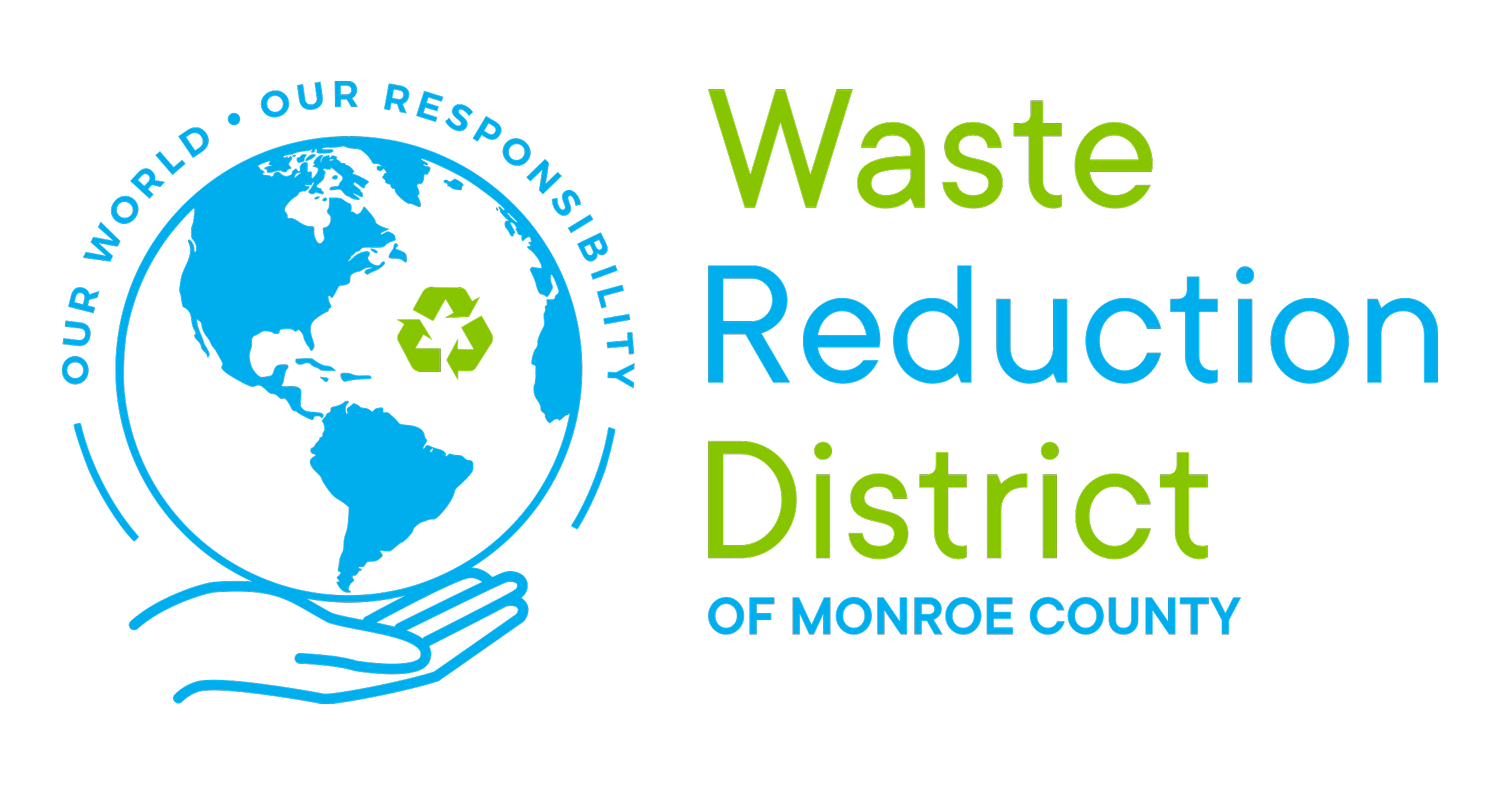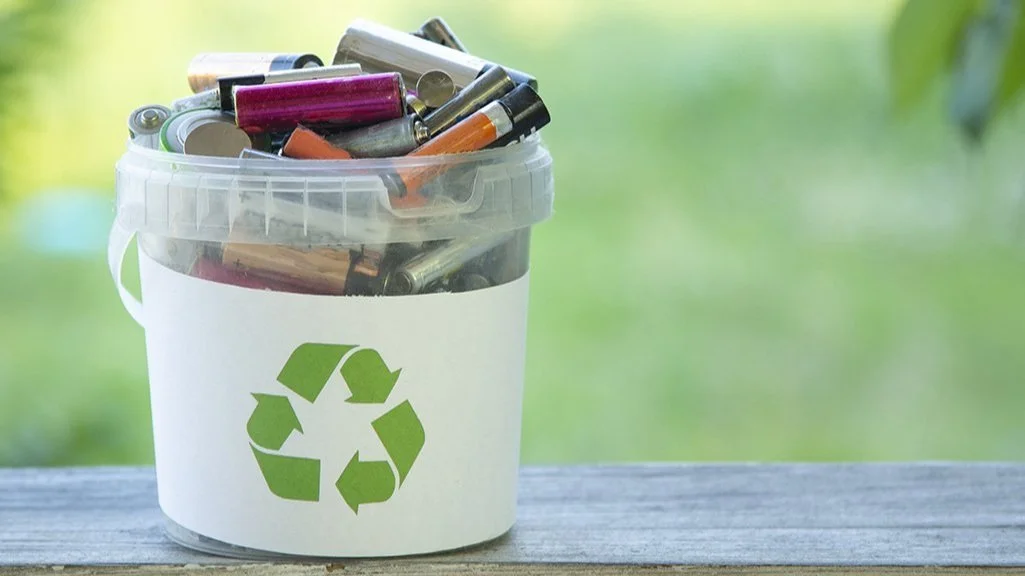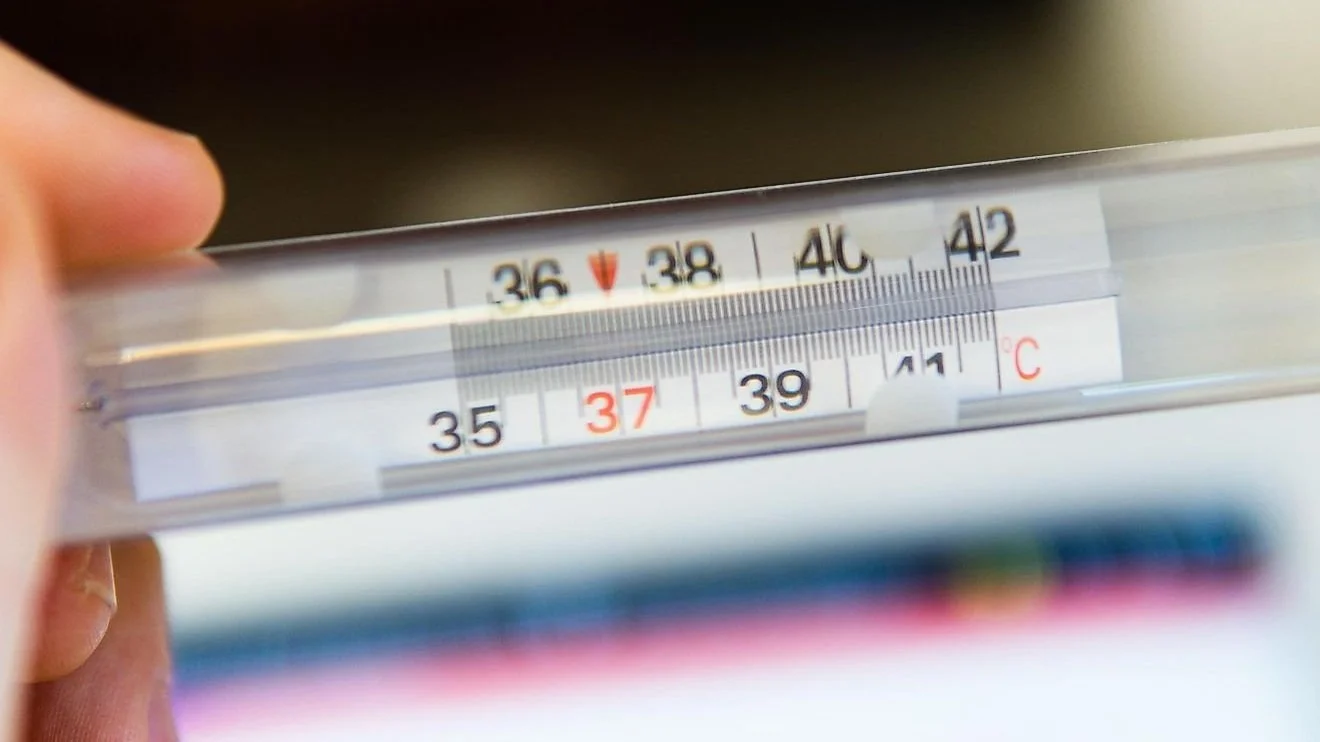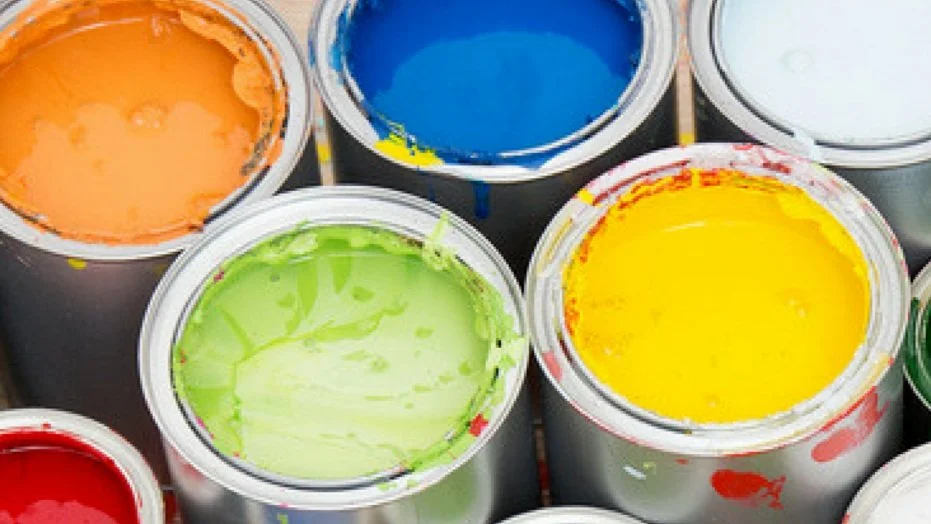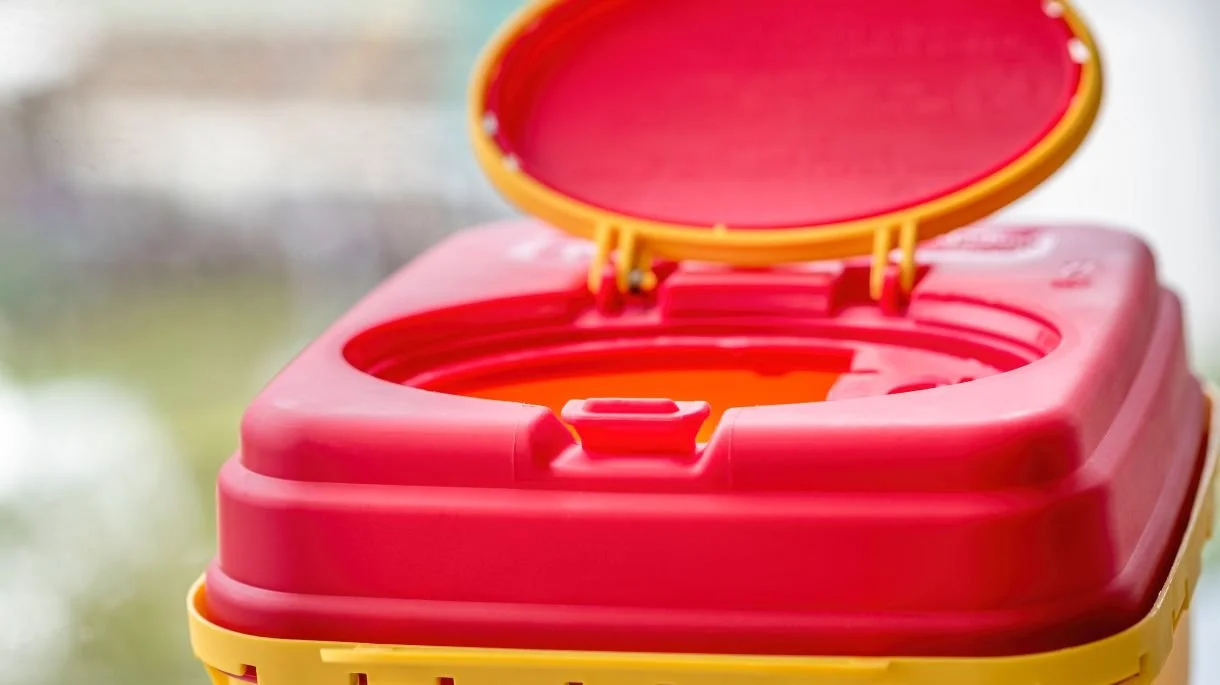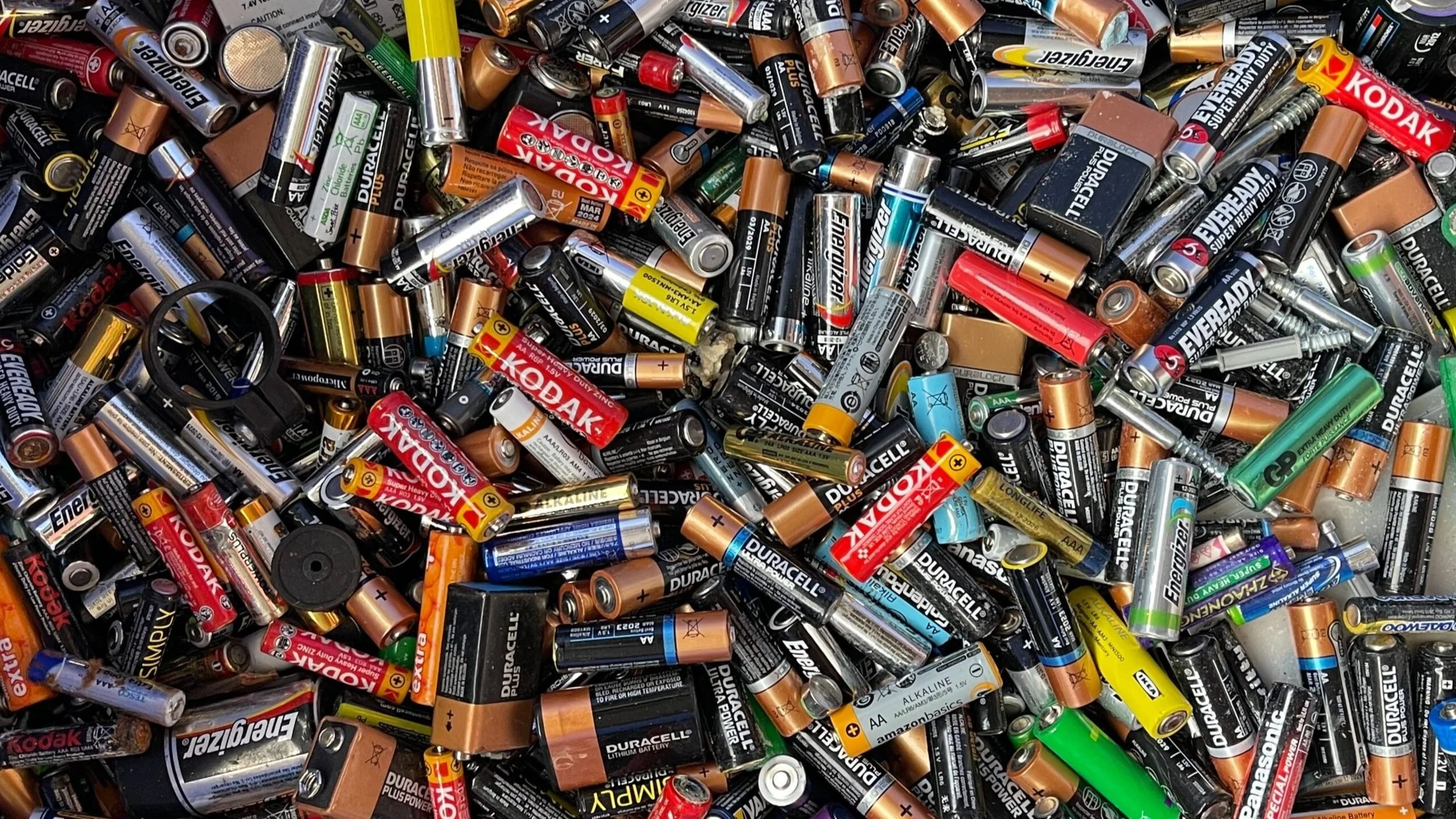
Household Hazardous Waste
The Hazardous Materials facility is your place for recycling, reuse, and proper management of your household hazardous materials. Electronics, Freon appliances, household materials including medical aids, paints, cleaners, and other common substances are hazardous waste that can pollute our soil, water, and air.
Open Tuesday – Saturday
7:30 am to 5:30 pm
3400 S. Walnut St. Bloomington, IN 47401
812-349-2848
Use the navigation below to find additional information on how and where to dispose of household hazardous material!
Automotive & Petroleum
Used motor oil, oil filters, and antifreeze are accepted at all locations.
All other auto fluids will only be accepted at the South Walnut Recycling Center.
-
Pour them into their designated tank or drum. The containers you store oil or antifreeze in cannot be recycled. They are normal household trash.
A variety of toxic products are associated with the operation of cars, trucks, motorcycles, snowmobiles, lawnmowers, chain saws, and other equipment using petroleum products. Motor oil, antifreeze, transmission fluid, brake fluid, lead-acid batteries, gasoline, and other fuels may be highly flammable as well as toxic. Extreme caution should be taken when handling these materials. They may be a hazard to health and the environment if disposed of improperly.
NEVER DISPOSE OF ANY OF THESE PRODUCTS BY POURING THEM ON THE GROUND OR DOWN THE DRAIN OR THROWING THEM IN THE TRASH.
Used motor oil pollutes our water. Nearly every household in the United States generates used motor oil. Automobiles and light trucks produce over 600 million gallons of used oil annually. According to the U.S. Environmental Protection Agency, over 200 million gallons of this oil is tossed into the trash, spilled onto the ground, or poured down drains and sewers each year. The catastrophic EXXON Valdez spill was small compared to the amount of oil dumped into backyards, ditches, and farm fields by Do-It-Yourself (DIY) oil changers.
During use, motor oil comes in contact with bearings, seals, and other engine parts which add heavy metals and other contaminants considered hazardous to humans. So improper disposal creates a real threat to human health. Used oil dumped onto the ground reduces soil productivity, contaminates groundwater, and can poison fish and other wildlife.
Just one gallon of used motor oil can ruin a million gallons of freshwater—an entire year's supply of drinking water for 50 people!
-
Used motor oil is an especially common waste product. Improperly discarded oil is a significant pollution problem across the United States. The oil drained from your car can be reprocessed and reused, thus conserving petroleum resources and preventing contamination of the environment. Used motor oil should be put in a sealed container, such as a milk jug with a cap, and taken to an oil recycling center.
NEVER MIX USED OIL TO BE RECYCLED WITH GASOLINE, HERBICIDES, PESTICIDES, PAINTS, SOLVENTS, OR ANY NON-PETROLEUM PRODUCTS.
Once added, they may permanently contaminate the oil, making it unrecyclable.
-
Transmission fluid is similar to motor oil and can be added to oil recycling.
-
Antifreeze contains the chemical ethylene glycol, which poses a potential health hazard to humans and animals. Its sweet taste and smell make it attractive to children and pets.
NEVER POUR OLD ANTIFREEZE IN A POP BOTTLE OR LET IT FORM A PUDDLE IN THE DRIVEWAY.
Antifreeze can pollute the ground surface, and drinking water supplies if poured into storm sewers or dumped on the ground. Some service stations now recycle used antifreeze. Antifreeze is accepted at all District locations, or check with local gas stations or radiator repair shops for an antifreeze recycler near you.
If you cannot find anyone to recycle your antifreeze, you may be able to dispose of a SMALL—up to a quart—quantity of antifreeze by pouring it down the drain with lots of water. But, if you are on a city sewer service, you should call your waster water treatment plant to be sure the system can handle antifreeze.
WARNING: If you have a septic system, be aware that antifreeze can overwhelm the organisms in the system. No more than a quart at a time, mixed with generous quantities of water, should be disposed of in one week. This means if you have four quarts, you would dispose of them over a period of four weeks.
-
• Wet Cell
• Used car batteries
• Sealed lead-acid batteriesAutomotive batteries pose a hazard because of the toxicity and corrosiveness of the acid and metals in them. Marine, tractor, lawnmower, motorcycle, and other vehicle and equipment batteries should be taken to the Hazardous Material Facility.
-
Improper storage and disposal of waste tires poses significant health and environmental concerns. They do not decompose and can release pollutants into the ground and water, additionally, tires left exposed to sunlight can release methane into the air. If left outside they will collect rainwater, creating a breeding ground for mosquitos and other insects that can carry diseases harmful to humans. Improperly stored waste tires can also create a fire hazard, burning tires release pollutants into the air, are difficult to extinguish, and will leave an oily residue that will contaminate the ground.
Waste tires can be recycled, the District accepts waste tires from Monroe County residents at the Household Hazardous Waste facility. Customers are limited to five (5) tires per visit. Only the following types of tires will be accepted, and the indicated fees will apply:
• Car, light truck, SUV, pick-up truck, motorcycle, & lawn mower tires off rim $4.00 each
• Car, light truck, SUV, pick-up truck, motorcycle, & lawn mower tires on rim $11.00 each
• Kart (golf, go-kart, mini, etc.) tire off rim $4.00 each
• Kart (golf, go-kart, mini, etc.) tire on rim $11.00 each
• Mud Aggressive (ATV, off-road) tire off rim $8.00 each
• Mud Aggressive (ATV, off-road) tire on rim $16.00 each
• Bicycle tire on or off rim $2.50 eachThis service is not available to businesses or out-of-county residents.
Re-refined oil decreases our dependency on foreign oil.
Recycling used motor oil decreases our dependency on natural resources and conserves energy. Three times more energy is used to process crude oil than to re-refine used oil. By recycling, the U.S. can save thousands of barrels of oil per day. It takes just one gallon of used oil, compared with 42 gallons of crude oil, to produce the same 2.5 quarts of lubricating oil. As for quality, today's re-refined oil products meet or exceed the same stringent performance standards that apply to virgin oil products.
Recycling oil filters saves resources & energy
Americans change over 400 million oil filters a year! These filters contain a high steel content and additional motor oil, both easily recycled. If all of the oil filters manufactured in 1994 had been recycled, an estimated 161,500 tons of steel could have been recovered and 17.8 million gallons of used oil would have been kept out of our fields and waterways.
Unfortunately, most used oil filters are not recycled, so the oil they contain is released into the environment. Currently, 90% of do-it-yourselfers throw their filters in the trash, sending about 10 million gallons of used oil to landfills every year.
Recovering antifreeze is easy & economical
U.S. cars generate over 60 million gallons of used antifreeze each year. Most antifreeze contains the poisonous chemical ethylene glycol. Like motor oil, used antifreeze also collects hazardous contaminants from the engine during use. Antifreeze has a sweet taste that attracts children and pets. It may cause injury or death through ingestion, inhalation, or skin absorption. In the past, disposal of used ethylene glycol has included treating it as a hazardous waste, discharging it into municipal sewer systems, or illegally pouring it into dry wells and storm drains. These methods of disposal are no longer necessary because now antifreeze can be recycled easily and inexpensively.
Freon Appliances
Freon appliances are accepted only at the South Walnut Recycling Center.
Freon appliance recycling is available for items such as refrigerators, freezers, air conditioners, and dehumidifiers.
The appliances are then picked up by a company that safely recovers the Freon and recycles the unit. When Freon-containing appliances are disposed of properly, it keeps our environment healthy by keeping chemical contaminants out of our air, soil, and water.
A standard fee of Twenty Dollars ($20.00), per unit, shall be charged for the collection and handling of appliances containing chlorofluorocarbons (CFCs) like refrigerant, including but not restricted to air conditioners, freezers, and refrigerators.
A standard fee of Fifty Dollars ($50.00), per unit, shall be charged for the collection and handling of larger items containing chlorofluorocarbons, including but not restricted to commercial coolers, cola machines, and medical equipment.
Gasoline Disposal
Gasoline disposal is accepted only at the South Walnut Recycling Center.
Gasoline is one of the most dangerous substances found around the home. It is both highly flammable and extremely toxic. Improper disposal and storage of gasoline not only presents a health and safety hazard but also threatens the quality of the environment.
Never dispose of gasoline by pouring it on the ground, down the drain, or throwing it in the trash. Never mix gasoline with other products.
-
Any time gasoline is not used for its intended purpose, it becomes a hazardous waste. Usually, this happens when gasoline has been stored for a very long period of time or has been contaminated with rust, dirt, or water.
-
As gasoline ages, some of its components evaporate, leaving behind a thickened material like a lacquer or varnish, which may be difficult for an engine to burn. To avoid this problem, store gasoline in an air-tight container. This will prolong the life of the gasoline.
-
To dilute old gasoline, simply mix it with at least three times as much fresh gas. For example, one quart of old gasoline should be mixed with three quarts of fresh. Generally, the more the old gas is diluted, the better the engine will run. This may be done right in the gas tank if it is large enough to hold the necessary quantities. Otherwise, combine the gas in an approved gasoline container.
Work outside away from flames or heat. DO NOT SMOKE. If you wish to use the old gas in your car, put approximately one gallon of old gasoline in each time you fill the tank until it is gone.
If you have usable gasoline that you do not wish to use, give it to someone who will. Some large trucks, buses, and farm machinery can burn old fuel.
-
Since 2-cycle gas is actually a mixture of gasoline and oil, it can only be used in engines that specifically call for this kind of a mix.
As with plain gasoline, old 2-cycle gas can be diluted and used, but dilution must be done with more 2-cycle gas to keep the relative proportions of gas and oil the same. Do not dilute 2-cycle gas with straight gasoline or use it in engines for which it is not intended.
-
Dirt, rust, or other solids can be removed from gasoline by filtering it through two layers of thin cloth or a coffee filter. Work outside away from flames and heat and DO NOT SMOKE. The cloth or paper filters can be allowed to dry in a well-ventilated area away from children or pets and disposed of in your regular trash.
-
Water in a gas can sinks to the bottom. Gasoline that has been contaminated with small amounts of water can be restored by adding a fuel dryer. This is available at many hardware, auto parts, or lawnmower/equipment stores.
Gasoline with larger amounts of water can usually be salvaged by allowing the gas to sit undisturbed for one to two weeks until the water all settles to the bottom. Then carefully pour or siphon off as much gas as possible, leaving mostly water in the bottom of the original container. The remaining material should be handled as a Household Hazardous Waste.
Household Hazardous Material Disposal
Household hazardous materials are accepted only at the South Walnut Recycling Center.
You might be surprised to know that many of the familiar substances in your home are hazardous. The average household contains between 3 and 10 gallons of hazardous materials.
-
Do not discard old cleaning supplies by pouring them down the sink. We accept all types of cleaning supplies.
• Bathroom cleaner
• Bleach
• Ammonia -
Empty containers may be recycled.
-
Do not flush old medications down the toilet. Medications are incinerated. Confidentiality is assured. Click here for more info on pharmaceutical disposal.
-
Do not throw away old pesticides and fertilizers.
-
Examples of acids and bases in the home are:
• Drain opening agents
• Old cleaning chemicals
• Toilet cleaners
• CLR
• Lime Away
• Oxidizers
• Pool Chemicals
• Hydrogen Peroxide -
We accept propane tanks. They can be empty or full. Both 1lb and 20lb tanks are accepted.
-
• Gasoline
• Mineral Spirits
• Paint thinner
• Fuel Additives
• Brake FluidWe cannot accept:
• Radioactive substances. (Return these to the manufacturer)
• Asbestos
• Explosive substances including ammunition
• Tires
Your household contains hazardous materials if you have any of the following…
-
• aerosol cans
• cleaners
• drain cleaners
• floor care products
• metal polish
• oven cleaners -
• cleaners
• disinfectants
• hair relaxers
• medicines
• nail polish
• pharmaceuticals
• polish removers -
• fungicide
• herbicide
• insecticide
• rodent poisons
• weed killers
• pesticides -
• antifreeze
• auto batteries
• brake fluid
• degreaser
• gasoline
• kerosene
• lighter fluid
• motor oil
• oil filters -
• batteries
• furniture polish
• mothballs
• photographic fixer
• pool chemicals
• silver polish
• solvents
Battery Disposal
Batteries are accepted at all recycling locations!
There are several types of household batteries currently on the market: alkaline, mercury, lithium, rechargeable nickel-cadmium, nickel-metal hydride, lithium-ion, and the new rechargeable alkaline battery. These batteries contain such metals as mercury, cadmium, lithium, and copper.
All of these metals pose a potential threat to our health and environment if they are improperly disposed of by dumping or burning. Recycle household batteries! All household batteries can be recycled!
-
• Dry Cell
• All household batteries
• Alkaline
• Nickel-Cadmium
• Nickel-Metal Hydride
• Silver Oxide
• Mercury
• Lithium
• Lithium-Ion
• Lead Acid -
The metals in household batteries can be reclaimed and used in other products!
Alkaline batteries are the most common household battery and include AA, AAA, C, D, 9 volt, and lantern type batteries. In spite of recent reductions in mercury content, alkaline batteries still contribute a significant amount of mercury to the waste stream.
Button batteries are so-called because of their size and shape. They are used in watches, cameras, calculators, hearing aids, and electronic games. Mercuric oxide and silver oxide are their primary components.
Rechargeable batteries can be reused many times, but they do eventually wear out. These batteries can be recycled with your other household batteries. The new rechargeable alkaline battery has the advantage that it contains no added cadmium.
-
Thirty-five percent of all background mercury comes from incinerating batteries with your household garbage.
Mercury and mercury compounds in batteries are highly toxic to people, wildlife, and the environment. Health risks associated with mercury include kidney damage and genetic, neurological, and psychological disorders. Cadmium is a confirmed human carcinogen and is poisonous when ingested or inhaled.
Collecting household batteries for recycling keeps the metals out of landfills, burn barrels, and incinerators. It reduces our exposure to these metals, and it reclaims a valuable resource.
-
• Use solar powered products whenever possible.
• Plug in an AC/DC adapter when you can.
• Use rechargeable batteries, especially the new alkaline rechargeables.
• Recycle all your household batteries at your local collection site.
• Pass the word about battery collection in the county.
Don’t be part of the problem - be part of the solution!
Each household in the U.S. discards an estimated 2 pounds of batteries annually - that's 2.5 million pounds of batteries entering the waste stream each year.
Household batteries account for over half of the cadmium and most of the mercury in our trash. The dumping and burning of household batteries are partially responsible for the contamination of fish, soil, air, and groundwater in Indiana.
Mercury Disposal
Mercury is accepted only at the South Walnut Recycling Center.
Mercury in any form is accepted:
Thermometers
Thermostats
Fluorescent light bulbs
High intensity discharge bulbs
Elemental mercury
Mercury-containing compounds
Debris
Devices
Paint Exchange & Disposal
Paint is accepted only at the South Walnut Recycling Center.
We accept all kinds of paints and stains! The reusable paint we receive is placed in the Haz Bin room to be used by residents for small home projects.
While you're at the facility, be sure to visit the Paint & Materials Exchange at the Central Station's Hazardous Materials Facility. When the public drops off hazardous materials, we check them and put the usable products in the HazBin. For example, on an average day, we take in anywhere from 25 - 100 gallons of paints. Sometimes good paint comes in unopened. You might also be able to pick up some household cleaning solvents, auto fluids, or lawn and garden chemicals, depending on availability.
-
• Latex (free to donate)
• Dried
• Frozen
• Liquid
• Oil-based
• Paint-related products
• Lead-based paint and paint chips are free of charge
• Rags used while applying linseed oil, paint thinner, mineral spirits, etc.Non-reusable latex paint is accepted for a fee:
• 1 quart or smaller = $2.00
• 1 gallon or smaller = $5.00
• 5 gallon or smaller = $20.00 -
The quantity of paint needed can be determined by calculating the square footage of the walls being painted less windows and door openings. The paint can label will generally provide information on the square footage for which that particular paint will cover. If unused paint is left after the job is completed, apply a second, third... coat until the paint container is completely empty. Once the paint can is empty and dry, dispose of the empty can in the garbage or recycle the steel paint can at a metal recycler listed in the yellow pages under Recyclers or Scrap Dealers.
-
Closets, under-side of steps, fences, dog house, attic, etc. Once the paint can is empty and dry, dispose of the empty paint can in the garbage or recycle the steel paint can at a metal recycler listed in the yellow pages under Recycling or Scrap Dealers.
-
If you can't use your leftover paint, give it to someone who can. Usable paint may also be donated to friends and neighbors, housing assistance organizations, local community projects, schools, churches, local shelters and theatre groups, community outreach groups, Recreation departments, Park departments, or other similar groups in your area. You can also bring it to the Hazardous Materials Facility's Haz Bin Room for reuse. You may be able to write a portion of this donation off on your income taxes.
-
First, let the paint particles settle to the bottom of the container in which you cleaned the brushes. The container should have a top to keep the liquid from evaporating during the process. After several days, pour the clear liquid into a clean, closed container for reuse on future paint cleaning projects. You may filter the liquid through a coffee filter to keep any paint particles from passing through.
Step 1: Find an outside work area away from children, pets and rain. Locked screen porches and storage sheds work well. Some latex paint contains lead and mercury so it's important to dry paint outdoors in a safe sheltered place.
Step 2: Dry it. Choose one of the drying methods described later on this page. Paint will take between several days and several months to dry. It depends on the type and quantity that you have.
Step 3: Throw the dried paint and other materials in the trash. Your empty metal paint cans can be recycled. Leave the lids off the dry paint cans to show they are empty.
For small amounts: Brush latex paint in layers on newspaper or cardboard and let dry. For larger amounts: Pour thick layers (less than one inch) of paint onto cardboard or plastic. Allow the paint to dry one layer at a time. Thin layers will speed up the drying process.
Household paints and solvents contain chemicals that can endanger human health and the environment if disposed of improperly. Since household paints and solvents are considered household hazardous wastes, they should be purchased and handled appropriately!
Pharmaceuticals Disposal
Please take prescription pharmaceuticals to the Sheriff Station 301 N. College Avenue.
The Monroe County Solid Waste Management District only accepts over-the-counter, non-prescription medications in the original container.
These will only be accepted at the Household Hazardous Waste facility and must be in their original container/packaging.
-
Old medications should not be disposed of with your regular trash, nor should they ever be flushed down the toilet.
-
Unused drugs and drugs that have expired are a common household health threat to children and animals. When flushed down the drain or burned, they can release toxic chemicals into the environment. Some of these chemicals can damage septic systems and sewage treatment plants. There is a concern that released antibiotics may produce bacterial strains that are resistant to the antibiotic. Other drugs can be scavenged from the trash and illegally sold within the community.
-
• All expired pharmaceuticals.
• All unsealed syrups or eye drops.
• All pharmaceuticals that should have been kept cold but were not.
• All bulk or loose tablets and capsules.
• All unsealed tubes of creams, ointments, etc.
• Properly contained medical sharps.The pharmaceuticals are disposed of in a high-temperature incinerator.
Sharps Disposal
Approed Sharps are accepted only in sharps containers at the South Walnut Recycling Center.
Approved sharps containers are available free of charge to Monroe County residents from the Household Hazardous Waste facility.
These are objects that penetrate the body such as needles, scalpels, lancets, syringes, broken capillary tubes and glass, knives, exposed dental wires, drills, and burs. Never overfill or force items into the container.
Universal Waste Disposal
Universal waste is accepted only at the South Walnut Recycling Center.
The Hazardous Materials Facility manages Universal Wastes under the Indiana Universal Waste Rule (329 IAC 3.1-16, incorporating 40 CFR 273).
-
This includes discarded primary (non-rechargeable) and secondary (rechargeable) batteries that contain elements such as cadmium, lead, or mercury, which would render them RCRA-hazardous. Examples are nickel-cadmium (Ni-Cad), sealed lead-acid, or mercury oxide batteries. Lead-acid batteries (such as automotive batteries) that are generated, transported, or collected to be reclaimed, or regenerated, but not reclaimed where stored, under provisions of 40 CFR 266, Subpart G, "Spent Lead-Acid Batteries Being Reclaimed," do not need to be managed as universal waste. However, waste lead-acid batteries not managed, or eligible for management, under 40 CFR 266, Subpart G, are subject to the Universal Waste Rule requirements. Lead-acid batteries that are stored at facilities that reclaim them are subject to RCRA regulation as specified in 40 CFR 266.80.
Many commonly generated waste batteries, such as dry-cell zinc-carbon and alkaline ("long life") batteries, typically do not contain appreciable amounts of the hazardous elements of concern, and hence would not be required to be managed as universal waste. However, they may be managed along with universal waste batteries, and this is encouraged in the interest of diverting them from less desirable disposal destinies such as incineration or disposal in solid waste landfills.
-
Several classes of discarded pesticides that would otherwise be regulated as characteristic or listed hazardous waste may be eligible for management under the Universal Waste Rule: Stocks of unused suspended or canceled pesticides that are subject to a voluntary or mandatory recall under section 19(b) of the Federal Insecticide, Fungicide, and Rodenticide Act (FIFRA), or a voluntary recall by a registrant of a pesticide that is not in compliance with FIFRA; Stocks of other unused pesticide products that are collected and managed as part of a waste pesticide collection program.
Pesticides not subject to the prescribed recalls may have to be managed as hazardous waste when discarded. Farmers managing and disposing of such pesticides in accordance with the hazardous waste exclusion in 40 CFR 262.70, and complying with prescribed disposal instructions, are not subject to the Universal Waste Rule. Recall or unused pesticides are not considered waste until a decision to discard them has been made. However, they remain subject to the requirements of FIFRA. Questions concerning the requirements or applicability of FIFRA to pesticide management should be directed to the Office of the Indiana State Chemist located at Purdue University, phone AC 765.494.1492.
-
This category of universal waste is restricted to thermostats that contain mercury, or the mercury-containing ampoules removed from such thermostats. It does not include other mercury-containing items such as thermometers, switches, gauges, relays, etc. The Rule allows for the management of this waste either as intact thermostats or as removed mercury-containing ampules when specified measures to prevent environmental release of mercury are followed.
-
This category has been added to those listed in the Federal Rule 40 CFR 273 by Indiana rule 329 IAC 3.1 - 16. Fluorescent light bulbs are the most common item in this category of universal waste, which includes any type of discarded electric lamp which contains mercury. This category does not include associated light fixture components such as ballasts. Mercury-containing lamps become subject to this rule if they are hazardous waste under 40 CFR 261, and when they are permanently removed from a fixture or determined to be discarded.
Any materials resulting from the release, or clean up of spills or breakage, of any universal waste, is not itself the universal waste. It must be determined whether or not such materials are hazardous waste as identified in 40 CFR 261, and the material must then be managed and disposed of in accordance with applicable hazardous or solid waste regulations.
Conditionally Exempt Small Quantity Generator:
Eligibility: The Hazardous Materials Facility manages Conditionally Exempt Small Quantity Generators’ (CESQG) Wastes and Universal Waste. A business must meet the conditions for exemption outlined in 40 CRF 262.16 to participate in the District's program.
Transporting and Labeling Waste: Caution should be taken when transporting hazardous material to the Facility. If possible, use the original product container, or label the container if the contents are different than listed. Do not mix materials! All containers should have secure lids and be packed upright in a leak-proof box. Material Safety Data Sheets or any other information about the material (e.g. how it is used) should be provided.
Appointments: Businesses and all non-household entities (churches, schools, government agencies, and non-profit groups) need to make an appointment to drop off materials.
Aerosol & Gas Cylinders
Accepted only at the South Walnut Recycling Center
and only for Monroe County households (no business or out-of-county sources).
We accept both empty and full aerosol cans and Compressed Gas Cylinders (like propane, helium, oxygen, CO2, etc). Many aerosol products are used in the home - hair spray, cooking products, household cleaners, and spray paint, to name just a few. If they are disposed of improperly, they can create health, safety, and environmental problems.
-
Aerosols use liquid or gaseous propellants. Some aerosols contain organic solvents to dissolve or suspend substances.
Using an aerosol product can present a health threat. The small size of aerosol-propelled particles allows easier absorption into the lungs and bloodstream, significantly increasing the potential for harm from the active and inert product ingredients. Avoid inhaling aerosol vapors, especially if the product contains a solvent or pesticide (e.g., spray paint, carburetor cleaners, or wasp spray).
The Consumer Product Safety Commission is requiring that products containing METHYLENE CHLORIDE be labeled to warn consumers that it may pose a cancer threat.
METHYLENE CHLORIDE had been commonly found in aerosol cosmetic products - primarily hair sprays. It may also be used in paint strippers and thinners, wood stain and varnishes, spray paints and primers, spray shoe polish, household adhesives, and adhesive removers, glass frosting, and water repellents.
Products purchased before April 1988 may not have a warning label so read the product label carefully.
-
Compressed fuel tanks and aerosol containers pose a safety hazard because they are pressurized. When disposed of in the trash or recycling, the containers can be punctured in the hauling truck or at the landfill or sorting facility, releasing the chemicals in the containers. Punctured containers will easily explode or catch fire causing injury to sanitation workers and damage to equipment.
-
When using an aerosol product, read the label and follow the directions. If you use a product containing methylene chloride, use it outdoors or under high ventilation conditions. This means that air is moving from a fan, an open window, or an open door. Wear gloves and follow all the instructions. When spraying something like paint on large items, start from the bottom and work up, as the heavy vapors settle lower.
When using compressed fuels, always do so in a well-ventilated area to avoid risks of fuel or exhaust buildups, and always close the release valve after every use.
When Disposing of aerosol products or compressed fuel tanks, even when they appear empty, do not throw them in your regular waste or recycling containers. Always bring them to the HHW facility so their gases can be safely evacuated, and their metals can be properly recycled.
Best practice: avoid the issue altogether
When it comes to aerosol cans, if a similar product is available in a pump container, use it instead. More and more products are now available in pump containers which make it possible to refill the pump sprayer, thereby reducing the health risks of the gas emissions, as well as the volume of cans produced and disposed of.
When purchasing compressed fuel, always use a refillable tank. Instead of paying for and disposing of single-use tanks over and over again, buy 2 tanks so you can always rotate the full one in and get the empty one refilled.
NOT ACCEPTED
The following items are controlled by even stricter regulations than the HHW standard and cannot be handled at our facility:
Radioactive substances. (Return these to the manufacturer)
Explosive substances including ammunition
Asbestos
-
Asbestos is the common name for a group of naturally occurring silicate materials that separate into fibers. The fibers are fire-resistant, very strong, and not easily destroyed or degraded by natural processes. Asbestos was used for many years in home building products.
Concern for asbestos contamination within the home is due to research linking lung cancer and other lung diseases to the inhalation of asbestos fibers.
Although the health hazards of low-level asbestos exposure are still undetermined, it is prudent to reduce exposure as much as possible.
-
A health threat exists only when asbestos fibers are released from the product and float freely in the air where they can be inhaled. The fibers are so tiny that they cannot be seen. They may pass through the filter of normal vacuum cleaners. The more crumbly the material, the more likely it will pose a significant risk.
It may be better to leave asbestos that is in good condition alone! Improper removal of asbestos can create a health risk because the fibers are released into the air. A licensed asbestos removal contractor is highly recommended if it is necessary to handle the material.
-
The following areas of the home are most likely to have asbestos in them:
FIREPLACES. Artificial ashes and some artificial logs sold for gas fireplaces were 90 to 100 percent asbestos. The ash is very dangerous and this product was banned in 1978, but may still be in some homes.
HEATING SYSTEMS. Pipes, metal heating ducts, and boilers may be wrapped in asbestos insulation. This kind of insulation can release asbestos if damaged or if improperly removed. Asbestos tape or paper may be inside heater registers. Blowing air through the system can cause the surface to release fibers. The furnace may be sitting on an asbestos pad. If it is damaged or deteriorating it should be removed. Repairs to heating systems that contain asbestos materials should be done by a licensed contractor.
BASEMENTS OR CRAWL SPACES. These areas may become contaminated if material from pipes or heat ducts falls on the floor. Sweeping or walking in it can produce airborne fibers and thus create a hazard.
FUSE BOXES AND GASKETS. Old fuse boxes and the door gaskets of some wood-burning stoves, older furnaces, and hobby kilns may contain asbestos. Contact the manufacturer if you suspect asbestos. Be sure to include such information as serial and model numbers.
FLOORS. Asbestos-backed linoleum vinyl floor tiles can release asbestos if broken, pulled up, or sanded. It is better to cover an old floor with particle board or plywood before installing a new one. An undisturbed floor is not a hazard.
CEILINGS. Textured acoustical ceiling tiles are generally NOT a problem as long as they are not damaged. Try not to disturb the ceiling. Sweeping for cobwebs or painting may release fibers. Instead, use a damp cloth and dispose of the cloth in a plastic bag.
WALLS. Homes constructed between 1930 and 1950 may contain asbestos insulation between the walls. This is a problem only if the insulation is disturbed. Use a trained contractor if undertaking major renovations.
ROOFS, SHINGLES, SIDING. Some of these products contain asbestos. Since they are outdoors, the health risk is minimal. Unless heavily worn or heavily damaged, they can be left in place.
APPLIANCES. In the past, some parts of appliances contained asbestos. Today, asbestos is used only in parts that do not release fibers during use. If you are concerned about asbestos in an appliance, do not repair it yourself. Instead, hire a trained repair contractor to know how to avoid exposure.
